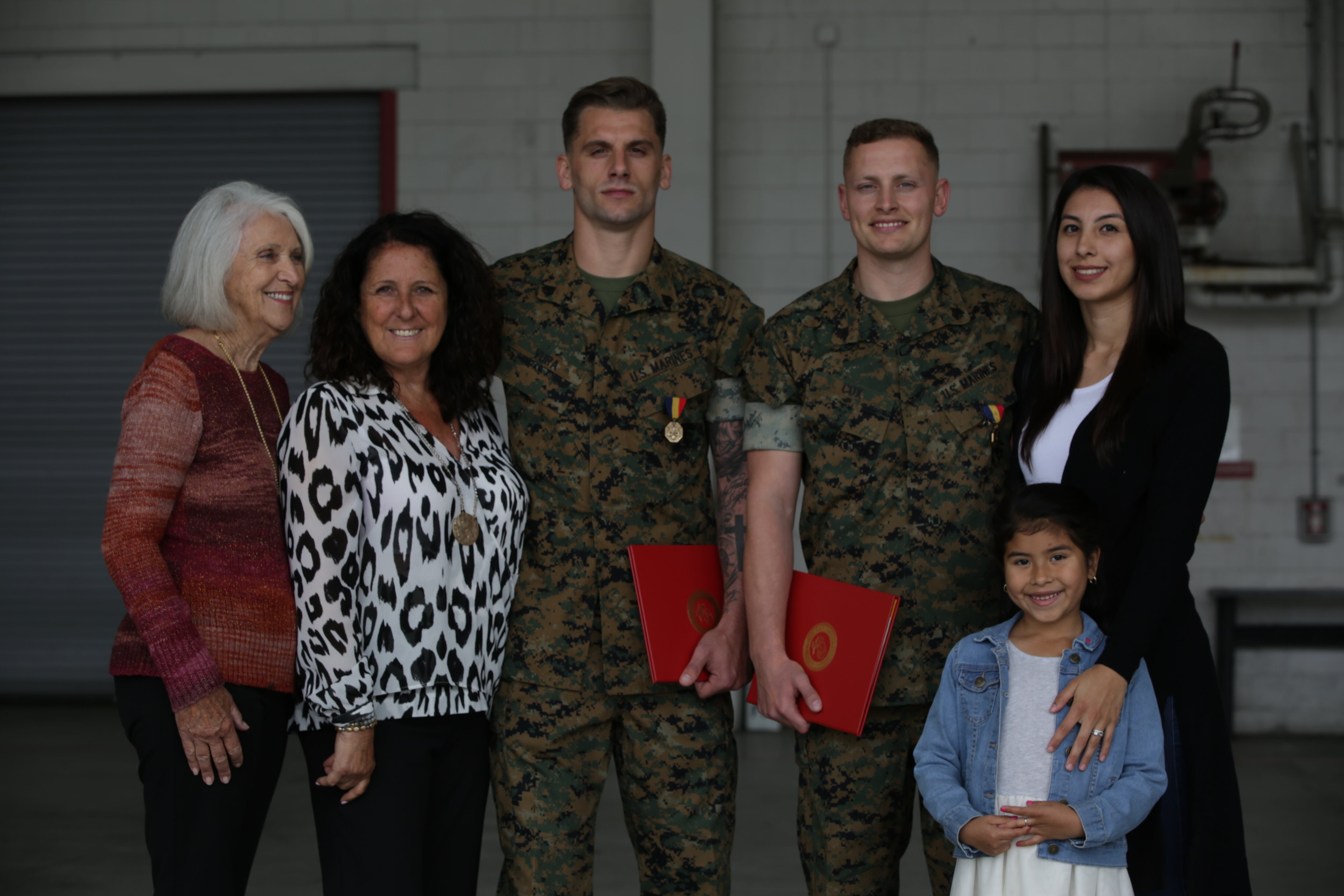Two Marines had just ordered drinks at the Route 91 Harvest music festival and were preparing to make their way to the stage when the music stopped and the shots started.
“I’m not going to lie, I was scared," 26-year-old Sgt. Michael Vura said in a recent Marine Corps video. “Seeing that initial reaction from everyone else around you, running away from it ... I recall looking at Sgt. Cox and he was like, ‘yo, we got to get up there and help.' That was the first thing that he said.”
Vura and Sgt. Austin Cox, also 26, received the Navy and Marine Corps Medal during an awards ceremony at Camp Pendleton, California, on April 29 for braving a barrage of gunfire to save victims of the music festival shooting in Las Vegas, Oct. 1, 2017.
It was the largest mass shooting in modern U.S. history. Fifty-nine people were killed and more than 500 were injured in the attack, which targeted a crowd of around 22,000 country music festival concertgoers.
The two Marines, both helicopter mechanics with Marine Light Attack Helicopter Training Squadron 303 at Camp Pendleton, California, attended the music festival to relax and get away from the the real world, but the event became one of the most significant moments of their lives.
“We had just gotten a few drinks, initial shots happened, we thought the music messed up,” Vura said in the video. “Lights went out; lights came back on. It happened again and at that time we realized what was going on.”
From the 32nd floor of the Mandalay Bay Hotel, a gunman opened up on the crowd below, firing more than 1,000 rounds over a period of ten minutes.
Vura and Cox ran toward where people were “getting trapped and barricaded” in the line of fire and started helping people get over that barricade, they said.
They first came across a man who had been shot in the chest. They began helping him, while instructing his significant other to maintain pressure on the chest wound and prevent the loss of blood. Then they turned to help others.
That’s when the two Marines saw Katrina Hannah.
“She had a neck wound,” Cox said. “We pulled her over the gate, started applying pressure to the neck and we noticed there was some more blood coming from somewhere else so we scanned her whole body, found another wound on her back.”

Vura said that Cox had Hannah’s wounds under control, and left to help others. He made his way around the music stage and came across a wounded man who had been shot on his right side and was bleeding from his arms.
“I ended up taking his belt off and using it as a tourniquet on his arm,” Vura said in the video. Then he continued along looking for more victims who needed help.
Vura and another concertgoer began knocking barricades down and using them to carry injured people out — about five people were rescued in total.
“Then there were probably four deceased bodies that got carried out,” he said.
By that point, police and SWAT teams had arrived on scene, and “kicked everyone out of that area,” Vura said.
Back where Cox and Hannah were located, the gunfire formed a fatal funnel.
“Shots were being fired, I could hear them against the stage just to my left and to the barrier to my right,” Cox said. “There was a pause and in that pause, I knew I just needed to pick her up and run for cover, so I did just that.”
Cox managed to get Hannah lifted into a vehicle and taken to the hospital.
“I remember the last thing she did when we got to the hospital was give me a thumbs up,” recalled Cox. “I knew she was going to fight and that I could leave her in the hands of the doctors.”
The Marines’ lives were changed that day. At any point, something like this can happen, according to Vura.
“The day itself was terrifying,” Cox said. “A whole lot of emotions come from it. ... I think about it weekly, daily.”
Vura added that their response to the shooting wasn’t planned. It was an extension of the training they received in the Corps.
“I did it because I was able to and that’s what you should do as just a decent human being," Vura said. "You should just help if you can.”
Cox and Vura received their awards in a ceremony on the flightline outside their squadron hangar. Their families, friends and fellow Marines were in attendance.
The Navy and Marine Corps Medal is the highest noncombat decoration awarded for heroism by the Department of the Navy.
Kyle Rempfer was an editor and reporter who has covered combat operations, criminal cases, foreign military assistance and training accidents. Before entering journalism, Kyle served in U.S. Air Force Special Tactics and deployed in 2014 to Paktika Province, Afghanistan, and Baghdad, Iraq.



